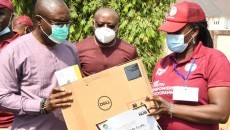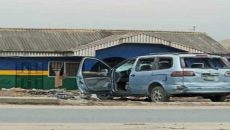Betty Efekhoda, Commissioner for Women Affairs and Social development says democracy has brought out the best in Delta women
In the 15 years of democracy in Delta State, how has the ministry impacted on the lives of the people?
I’ve been in this ministry almost three years now and we have actually done a lot under Dr. Emmanual Uduaghan. First of all, I would want to mention the ultra-modern Mariam Babangida Women Development Centre in Asaba. By the grace of God, we will commission it very soon. To me, it’s a good achievement because that’s the kind of women development centre where we will train women in various skills, hold seminars and do a lot of things. It’s a place where the women can call their own. The governor decided that the women are supposed to have such a place and he went ahead to do it. Apart from that, we have skill acquisition centres all over the state. There’s this new one that’s being built at Oleh; it’s for women too. We have one in Sapele, even in Asaba, we have where we train girls for various skills. The one in Asaba is both a boarding and day centre. At the end of the training, we start them off in business, giving them starter packs and also rolling them into the micro-credit scheme, so that they can take loans and start a very good business on their own. Apart from that, if you look at the health sector, we have built some toilets in some rural markets in the villages, with solar borehole to service the toilets because, like we do know, most of these rural markets don’t have toilet facilities. We have started it and completed most of them like the ones in Akwukwu Igbo, Oghara, Koko, Patani, Oleh, Ozoro, just to mention a few. That’s one area I think we have done well because it’s meant to take care of the hygiene situation of women as mothers and children. Then, we also carry out enlightenment campaigns. In collaboration with some NGOs, we go to schools to enlighten the girls about how not to expose themselves to rape and what to do when such a situation arises. We do campaigns against anti-social behaviour, prostitution, child trafficking; we do that, at times, even in the universities. We have one in collaboration with the Students Union government at Delta State University, Abraka, Anwai and other places.
We also deal with the social aspect as a result of which our lepers are being cared for. We pay them stipend every month. We spend over N5 million every month to pay stipend to ex-lepers and we have built and completed a block of ten flats of one-bedroom each for the ex-lepers at Eku to at least alleviate their situation where they live because we saw that they were having population increase. We also have the mentally-challenged people that we oversee. We have about five trado-medical homes for them. We pay these trado-medicalists for the upkeep of these mentally-challenged persons every month. That has to do with services, and its all part of good governance. Even these physically-challenged people, we also do what we can to train them in various skills. We send some of the blind ones to the craft school in Lagos and start them off. After that, we also enroll them into the micro-credit or for poverty alleviation scheme to help them in their small businesses.
The children too are under our care. When we had the Children’s Day where we organised a prayer, the children were in-charge of everything. It was only his Excellency that was the adult that spoke to them as the father of the state. We decided that our children parliamentarians will be active and we spend money in grooming them. We went round the state and selected those that will be fit to be in the children’s parliament. They have their speaker and other principal officers in place. Even last year, during the Children’s Day celebrations, they took over the House of Assembly. They were there to deliberate and even decided that children must not be denied education. That was why the master-of-ceremonies at the event, (Children’s Day 2014) who incidentally is the deputy speaker of the children’s parliament, was thanking the governor for creating the Edu-Marshal to make all children of school age go back to school. They are all very happy. So, that is one aspect we focus on, to encourage all children because we discovered that, since we set up this children’s parliament, a lot of interest is cropping up. People want their children to belong to that kind of cadre and the children too are happy. I’m glad about it because bringing up our children well is crucial to development because they are the future leaders.
What about women who are abused at home?
We settle cases and we have offices where we settle marital issues and we are doing a lot, at least with regards to issues that have not gone out of hand, because once they have gone out of hand, then it’s no longer under our purview and we refer them to court. Then there’s an aspect that relates to children. You know, these days generally, we have a lot of what I would call street children. We also have a remand home in Sapele that is functional. We are trying to put the one in Asaba in place. Once logistics is in place, we will have it. The governor is interested in dealing with that aspect of street children because there are people that abuse children which is not acceptable. So, we have a juvenile court and the governor also set up this Edu- Marshal thing that takes care of any child that is supposed to be in school that is not in school.
We also work with them. We have cases of four children that were arrested; they had nowhere to go to and we put them in our homes. There is one particular one that was abused by the guardian and we decided to take the child because the child told us that she could no longer stay in that house. She told us how she was always being forced to hawk and yet they don’t give her good attention. As I speak with you, the child is under our care and she’s very happy. And my ministry too interacts with the people in communities, including the presidents-general. At times, we help communities that have self-help projects with some things just to encourage them. And I’m very glad to say that there’s this project called SEEFOR that create jobs for the youths. It’s an arrangement by the World Bank, Federal and State governments and the area of community development is under my ministry and I’m very happy to say that very soon, communities will be benefiting from that project; benefiting in the sense that we go to the communities to ask them the kind of projects that they need. Most of them say they need town hall, borehole, maternity and all that. That’s another area where we are helping our communities.
Given the pattern of appointments, political and civil service, would you say the women have been given their fair share; may be talking about the 35 per cent affirmative action?
Yes, the governor has done well in that regard. In the state executive council, we have five female commissioners and four advisers, and, apart from that, when you look at the boards, you will see that we also have women that are chairmen of boards, about three of them and, as I speak to you, the Governor has appointed more than 20 women from each local government in women development committees. It’s unprecedented. So, he has tried in that regard and he even wants to appoint more. And he is the kind of person that, once you are due and he knows you know your work, he appoints. So he has done well for women. But you see, like the proverbial Oliver Twist, we always want more. In the last meeting I attended in Abuja, the women said we are even no longer asking for 35 per cent, we want 50 per cent. To me, I think the women are doing well, because years back, how many women would you find in the state executive council? So, I want to appreciate the Governor and even the President for their bold steps in appointments as it concerns women. We know that little drops of water will make a mighty ocean, and Rome, like they say, was not built in a day. It’s a gradual thing. Women are coming of age because even if you look at the elective positions, we have four women in the House of Representatives. Although it’s not enough, we have started.
And that brings me to the issue of stopping all harmful traditional practices against women. We have not gotten there yet, but we are making progress. Even now, most traditional rulers will agree that some traditions that are not useful should be discarded. Traditions are meant for us, we are not slaves to tradition and there is none that is even static. It’s supposed to be dynamic. Once you see something that is good, uphold it; if it’s no longer useful, discard or review it. All traditions or cultures should be seen that way. Apart from that, there are lots of things that the Governor has been doing for women that is not directly under my ministry, like the free maternal care and free under-five medical care that’s under the ministry of health. The free education is under the ministry of education but you see, directly or indirectly, the women are benefiting because when you pay the school fees or examination fee of a child, the woman is happy because when you look round, most of the women assist their husbands to pay the children’s school fees. So, when they are helped out, the women will feel some relief. Even, take the issue of the streetlights. When you go to Asaba, because of the streetlight, you find women trading at night. But for the light, by 5pm or 6pm, you will see them scurrying home; now they can stay and do their businesses till about 9pm to 10pm, and that means more income for them. Even if you look at the transportation, the women are also benefiting because they now go to their market with ease, with air-conditioned buses, unlike the rickety ones they were used to. So, the women of Delta State, I think have been benefiting a lot and I want to thank the Governor for giving us the opportunity to live better life and we know that he will do more. The administration of Dr Emmanuel Eweta Uduaghan has done so much, so well for women.
Follow Us on Social Media




 WhatsApp us
WhatsApp us